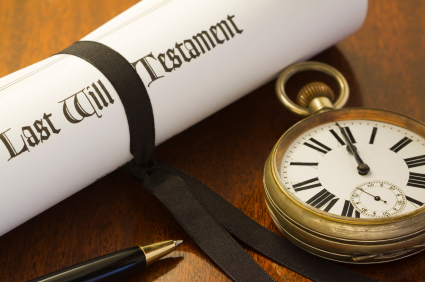 Despite what you may think, read or have been told, estate planning isn’t about what happens after you die. Under the best circumstances, it deals with the time before death. To cause less headaches and stress after your death, it’s best to take time now to do some estate planning measures.
Despite what you may think, read or have been told, estate planning isn’t about what happens after you die. Under the best circumstances, it deals with the time before death. To cause less headaches and stress after your death, it’s best to take time now to do some estate planning measures.
Estate planning is about how to pass your belongings on after your death to the recipients of your estate with the minimum amount of fuss, expense and taxes. The bottom line is simple: if you own something of value that you would pass on to someone else upon your death, you have an estate. Whether you know it or not, you also have an estate plan.
Where Do You Start?
There are several components that need to be considered when it comes to estate planning. They include: a will; assigning Power of Attorney (POA); and a health care POA. In a nutshell, a will declares who gets your stuff after you’re dead. In legalese, it’s a personal declaration of your intentions about the distribution of your property at death. A family member or close friend is designed, by you, as your executor, or estate manager. With a will, you designate a guardian for minor or special needs children who are unable to fully care for themselves; the will can also detail plans for the special needs child after you’ve passed.
Wills don’t have to be complex documents. Depending on whom you want to receive your assets, how much your estate is worth, where you live, and what type of things you own, a simple will may be adequate to get the job done.
However, if there are particular items or gifts that you are wanting to give away, it needs to be documented in a will. If Dad wants Junior to have the 200-acre family farm, or Auntie Jane wants nephew Sam to inherit her 40-years worth of National Geographic, it needs to be recorded in the will. Talking about passing on the farm or the magazine collection round the dinner table at Thanksgiving isn’t good enough; hearsay will not hold up in court. It needs to be recorded and documented.
Do You Need A Will?
There is no legal requirement that calls for a will to be created by an attorney, but a home-made will or one picked up at the local office supply store or the Internet may cause problems, since the creator (that’s you) can’t explain your true intentions because you’re dead.
If you’re not sold on the idea of a will, or you have a sizable estate and pass away without a will, here’s something to consider. Without a question of doubt, your estate will go to probate, and it’s not a fun thing. For starters, it involves going to court (multiple times), and everything you own will be made public (whereas with a will, everything is kept private). Probate is a one- to two-year process (and maybe longer, if the parties involved aren’t getting along). Attorneys love probate, why? They will earn 5 to 7 percent in the fees from the estate, before the family payout.
What Is A Power Of Attorney?
A Power of Attorney (POA) is a document that ensures someone will look after your affairs if you become incapacitated. It is frequently used in the event of the principal’s illness or disability, or when the principal can’t be present to sign necessary legal documents for financial transactions.
Being named a POA is not a responsibility to be taken lightly. Your family member chose someone – spouse, child, sibling, trusted family friend – to serve as his or her representativebecause you, the POA, will have their best interests in mind. Remember: signing a POA grants broad authority to an agent is very much like signing a black check, so make sure you choose wisely and understand the laws that apply to the document.
Going one step further is the medical or health care POA. It’s a legal document that designates a person to make health care decisions on behalf of the principal if he or she is unable to make such decisions. The health care POA goes into effect immediately after it’s executed and delivered to the representative, and is effective indefinitely unless it contains a specific termination date, it is revoked, or the principal becomes competent.
You might ask, is a health care POA really necessary? Isn’t a regular POA sufficient enough? There is the chance you may be unable to make decisions regarding your health care. If this does happen, it would be helpful to have someone you trust to make decisions for you, someone who knows your values and what your health care wishes are.
Here’s an example: Dad falls in the middle of the night and breaks his arm. He goes to the emergency room. You rush there and ask the nursing staff what’s going on. Does the hospital have to tell you? Because of the Health Insurance Portability and Accountability Act passed in 2003, without a health care POA, technically the hospital isn’t obligated to tell you anything. Chances are, if you’re immediate family, you will be told what’s going on. But some hospitals are strict with the rules, and won’t pass on any information. There have been extreme cases, like the example, where family members have had to go to court and get emergency guardianship over the loved one so they can be told what’s going on.
Here’s a fun fact to share round the water cooler or at your next cocktail party: Kentucky is the only state in the nation where guardianship is determined by a six-member jury. It’s not a quick process. It might take several days for all of the facts to be heard, and expert witnesses (doctors) can be called to testify.
The POA and health care POA could be two separate documents, or the attorney writing the POA could include the health care POA language, thus making one document. Also, like previously stated with the will, it’s best to have POAs created by an attorney.
The late John Lennon wrote, “Life is what happens while you are busy making other plans.” Things change, and life happens. A marriage, divorce or new child or grandchild, or a health issue can shift your thinking on what you want to happen with your affairs. Wills and POAs can easily be amended. The changes won’t happen overnight, but within a reasonable amount of time a new will and POA can be drawn up by an attorney.
No one likes to dwell on the prospect of his or her own death. But if you postpone planning for your demise until it is too late, you run the risk that your intended beneficiaries – those you love the most – may not receive what you would want them to receive. This is why estate planning is so important, no matter how small your estate may be. It allows you, while you are still living, to ensure that your property will go to the people you want, in the way you want, and when you want. It permits you to save as much as possible on taxes, court costs and attorneys’ fees; and it affords the comfort that your loved ones can mourn your loss without being simultaneously burdened.



